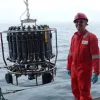
RRS James Cook in transit to the South Sandwich Islands
We have finished our work in the Bransfield Strait and now have a three day passage to our next working area near the southern most South Sandwich Island, Thule.
Our route takes us north-east past Gibbs, Elephant and Clarence Islands on a beautiful sunny…

The Axe, Bransfield Strait
Our final site within the Strait is aptly named ‘The Axe’. This is the least studied site that we have chosen to study and first we need to map the seafloor.
Again we use the conductivity-temperature-depth package to identify anomalous chemical signals in the deep water over the volcanic ridge.…

On 25 January 2011, Dr Jung-Keuk Kang, President of the Korea Ocean Research Development Institute (KORDI), Republic of South Korea, signed a new Memorandum of Understanding with the National Oceanography Centre (NOC), which is intended to enhance existing links between our two organisations and develop new collaborative research opportunities.
…

Three Sisters, Bransfield Strait
We have spent the weekend surveying our second volcanic target in Bransfield Strait: the Middle of the Three Sisters. Again we use the plume sniffing approach followed by video surveys of the seafloor before choosing our coring sites.
…

Mud sampling: 28 January 2011
Alfred Aquilina and the sediment sampling team have been working hard in the cold temperature lab to extract water from the stinking mud from around the hydrothermal sites. “The most exciting thing is to see the data that we process on board” says Alfred, “we are really productive at sea; working…

Pinpointing the Vents: 25 January 2011
By Wednesday we have criss-crossed the seafloor with our towed video sled and have mapped out the animal and substrate distribution on the seafloor. The shimmering water, chimneys and areas of hydrothermal mineralization are all clustered near the top of Hook Ridge.
…

Coring the seafloor: 23 January 2011
Sunday starts with a steam to a new position nearer to the Antarctic Peninsula where we have chosen a site to core the seafloor. Overnight we homed in on the chemical anomalies in the water column that tell us where the vent and seep sites are on the seafloor.
…

Statement by the National Oceanography Centre: The National Oceanography Centre in Southampton, UK, can confirm that there has been an incident involving the RRS James Cook in which the remotely operated vehicle (ROV) Isis came into contact with the ship’s port propeller.
The accident occurred during ROV deployment…

Day 3 – Monday 17 January 2011 – Crossing Drake Passage
Monday and we are out in the Drake Passage: a strong head wind slowing us slightly. Drake Passage, between Cape Horn at the tip of Chile and the Antarctica Peninsular, is a choke point for the Antarctic Circumpolar Current that travels around the continent of Antarctica.…

Professor Sir David King will chair the National Oceanography Centre’s newly formed Advisory Council. The inaugural meeting took place on Monday 12 January at the Institute of Physics in London, where Terms of Reference were agreed.
Sir David is Director of the Smith School of Enterprise and the Environment at the University of Oxford, Director of…